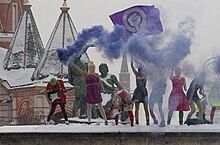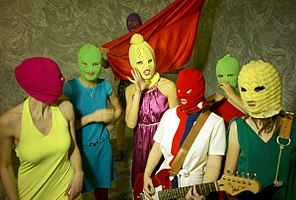The Secret to YouTube Success
There’ve been few videos more viewed in 2012 than the 40-second clip Pussy Riot uploaded last February. The video, which displays four women lip-synching in technicolor balaclavas, is one of the best-known YouTube clips of 2012. Weightier than Gangnam Style, more palatable than any campaign ad, the clip—which beckons those watching to “drive Putin away”—led to an international scandal and a worldwide swell of support.
The question is: why? Why is it that the women of Pussy Riot were able to craft a clip that redounded from Buenos Aires to Berlin, and led to anti-Putin protests at Russian embassies where none had existed before? Yes, Russian repression played a significant role in the video’s popularity. Pussy Riot’s shot to fame coincided with the Kremlin’s significant and perturbing crackdown on anti-Putin dissent.
But there are numerous protest videos, aired on a litany of causes, created every week. How is it that Pussy Riot’s managed to garner such acclaim?
Three researchers at The University of Texas think they’ve unlocked the formula for the video’s success. Last week, three electronic-commerce researchers filed a 45-page paper—”filled,” asBloomberg Businessweek noted, “with equations and Greek letters”—examining why it is that certain YouTube videos find success online, while others wither and fall into the Internet’s great abyss.
The paper, written by Liangfei Qiu, Qian Tang, and Andrew Whinston, is quick to note that the success Pussy Riot garnered was not gained “through their musicality per se.” Rather, the success was created from a concoction of two distinct ingredients. The first was termed “social learning,” which dictates that the higher the video’s view count, the higher the likelihood it will be viewed. A snowball effect, this phenomenon derives from the reality that the more viewers a video reaches, the more voices and outlet it creates to be passed to further eyes.
This metric relates to the second phenomenon, termed “network effect.” This effect relies on further social nuance, stating that the more people who’ve viewed a video, the more the video becomes worth watching. After all, if the clip becomes familiar to all those within a social circle, those who’ve not viewed it risk landing outside the conversation—that is, if you have no idea why your friends are suddenly wearing hot-pink balaclavas, you run the risk of falling behind on social opportunities.
The researchers said that successful videos carry a ratio of approximately 60 percent network effect and 40 percent social learning. As it pertained to the Pussy Riot clip, which maintained that ratio, “most viewers were drawn to [the video] out of curiosity and were interested in the messages the music carried.” That initial interest then snowballed, with social learning and the network effect—as well as vocal support from Madonna and the Red Hot Chili Pepper’s Anthony Kiedis—buoying the clip.
Of course, it is just such popularity that landed three members of Pussy Riot in prison—part of the continued crackdown on dissidents throughout the post-Soviet world. But now that we’ve a fuller understanding of what leads to a successful video, perhaps the next round can continue to bring their plight to light—or, in the least, allow us a reprieve from anyone else purporting to have perfected the dance from Gangnam Style.
Putin acusa Pussy Riot de encenar orgias em igrejas
 O presidente russo, que falava numa
entrevista à televisão estatal Russa, acusou as três jovens da banda de
terem encenado "orgias" em várias igrejas.
O presidente russo, que falava numa
entrevista à televisão estatal Russa, acusou as três jovens da banda de
terem encenado "orgias" em várias igrejas.
Para Putin, proteger os
crentes é especialmente importante dada a repressão sofrida pela Igreja
Ortodoxa durante o domínio soviético.
"O país tem lembranças muito graves do período inicial do domínio soviético, quando um grande número de padres sofreu", disse.
"Muitas igrejas foram destruídas e todas as nossas crenças tradicionais sofreram danos enormes", acrescentou.
Putin
questionou ainda a moral das três raparigas, cuja condenação a dois
anos de prisão por vandalismo gerou contestação a nível internacional.

Pussy Riot queimam fotografia de Putin em clip
“O nosso país é dominado por um homem diabólico”, dizem, acusando Putin de achar que cantar música punk e que ser feminista é ilegal e de entender que “se cantarmos e dançarmos numa forma inapropriada devemos ser presas durante dois anos”
Manifestação de apoio às "Pussy Riot"
O presidente russo, que falava numa entrevista à televisão estatal Russa, acusou as três jovens da banda de terem encenado "orgias" em várias igrejas.
Para Putin, proteger os crentes é especialmente importante dada a repressão sofrida pela Igreja Ortodoxa durante o domínio soviético.
Seven members of the band Pussy Riot
Pussy Riot is a Russian feminist punk-rock collective based in Moscow. Founded in August 2011, it consists of approximately 12 members, who wear brightly colored balaclavas and use only nicknames during interviews. They stage unannounced provocative performances about Russian political life in unusual and unauthorized locations, such as theYelokhovo Cathedral, Lobnoye Mesto in Red Square, on top of a trolleybus, or on a scaffold in the Moscow Metro. These performances are edited into videos and posted on the internet.
On February 21, 2012, five members of the group staged an illegal performance on the soleas of Moscow's Cathedral of Christ the Saviour.[1] Their actions were stopped by church security officials. By evening, they had turned it into a music video which they entitled “Punk Prayer - Mother of God, Chase Putin Away!”.
On March 3, two of the group members, Nadezhda Tolokonnikova and Maria Alyokhina, were arrested and charged withhooliganism. A third member, Yekaterina Samutsevich, was arrested on March 16.
The trial and conviction have attracted considerable criticism, particularly in the West. Public opinion in Russia has generally been less sympathetic towards the women.

Madonna drops swastika from concert, backs Pussy Riot
NICE, France — Madonna dropped from her last concert in Europe a swastika that outraged France's right-wing party but again demanded the freedom of jailed Russian girl punk band Pussy Riot.
The video that accompanied the pop icon's performance in Nice of "Nobody Knows Me" still showed National Front leader Marine Le Pen, but a question mark replaced a swastika that had previously flashed on the politician's forehead.
 Pussy Riot: Madonna supports punk trio at concert in Russia
Pussy Riot: Madonna supports punk trio at concert in Russia
Singer condemns persecution of the band by appearing on stage in Moscow with a balaclava and 'Pussy Riot' written on her back


Sem comentários:
Enviar um comentário